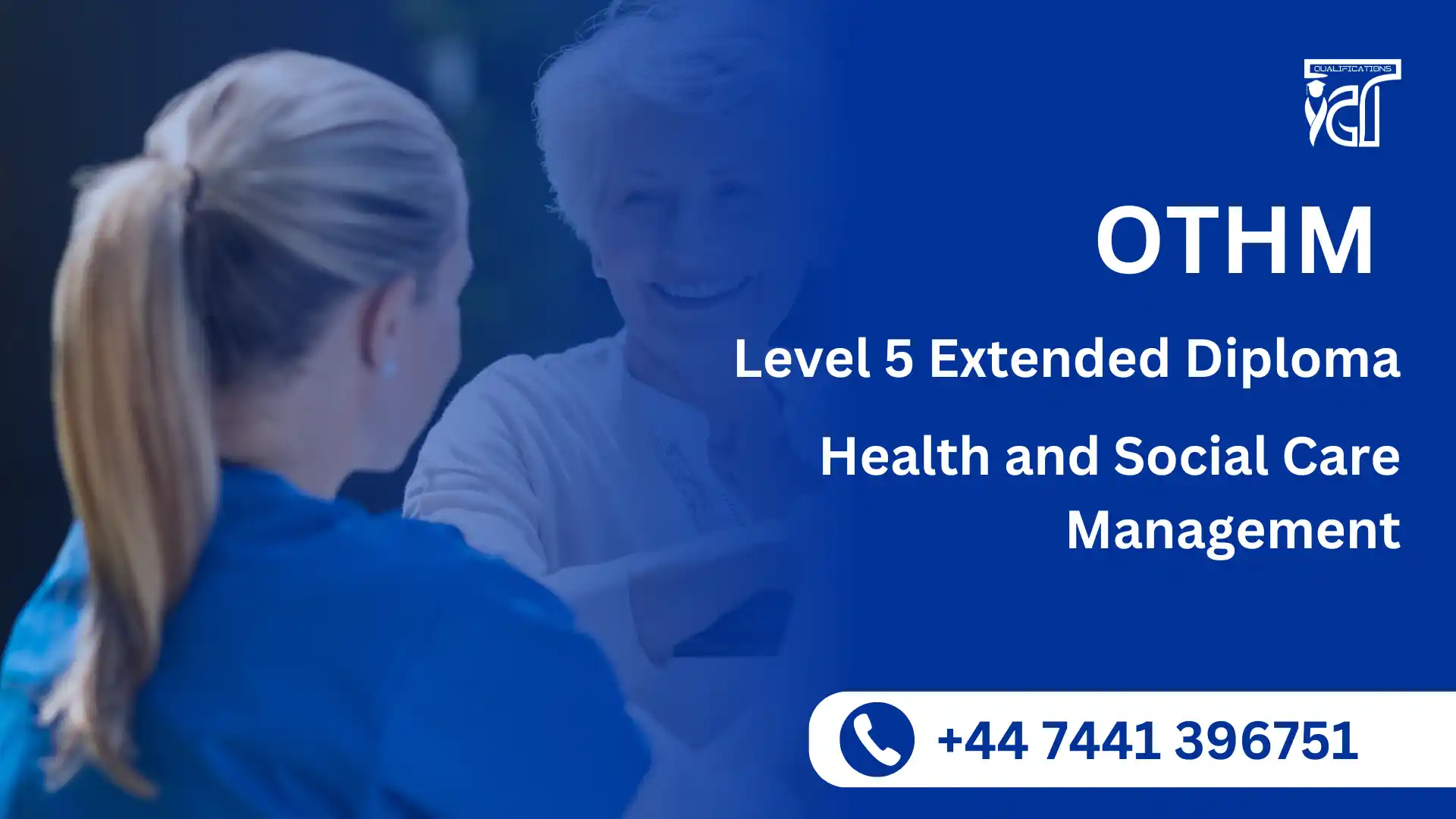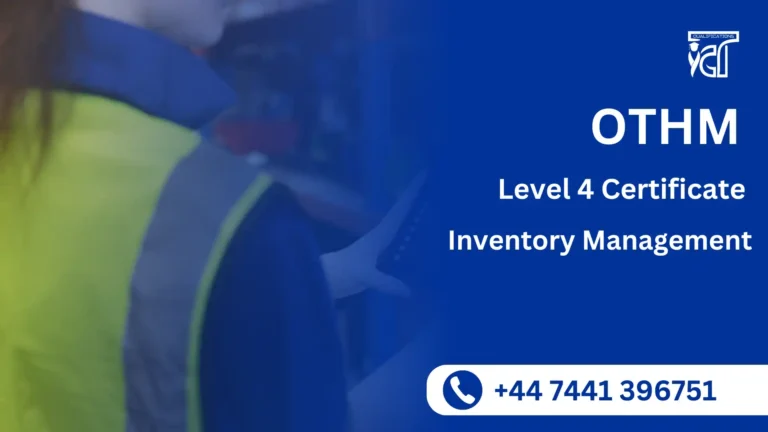The healthcare and social care sectors are rapidly evolving, demanding skilled managers who can lead teams, manage resources, and ensure high-quality care delivery. The OTHM Level 4 and Level 5 Combined Diploma in Health and Social Care Management is a comprehensive, Ofqual-regulated qualification that equips learners with essential management skills tailored to these critical industries.
This combined diploma provides an internationally recognised pathway to enhance leadership capabilities, improve service delivery, and prepare for advanced roles within health and social care organisations. Designed for both aspiring and current managers, it offers a flexible and practical learning approach that aligns with industry standards and best practices.
The OTHM Level 4 and Level 5 Combined Diploma in Health and Social Care Management merges two qualification levels into a single programme, offering 240 credits equivalent to the first two years of a bachelor’s degree. It is tailored for professionals aiming to develop their knowledge in managing health and social care services effectively.
Regulated by Ofqual (UK), this diploma ensures high-quality learning outcomes and is widely accepted by employers and academic institutions globally. The course uses a 100% assignment-based assessment method, allowing learners to apply theoretical knowledge to real-world management challenges.
This combined diploma covers a broad range of management topics specific to health and social care settings. It develops leadership skills, financial and resource management expertise, and a deep understanding of regulatory and ethical standards within the sector.
The OTHM Level 4 and Level 5 Combined Diploma in Health and Social Care Management is a valuable qualification for professionals aiming to lead and manage in one of the most vital sectors. With its focus on practical skills, ethical leadership, and flexible learning, it prepares learners to meet the challenges of modern health and social care environments effectively.
Enroll today to advance your career and contribute to delivering high-quality care services with confidence and competence.
OTHM Level 4 and Level 5 Combined Diploma in Health and Social Care Management
The OTHM Level 5 Extended Diploma in Health and Social Care Management consists of 12 mandatory units, totaling 240 credits and 2400 hours of Total Qualification Time (TQT). The recommended Guided Learning Hours (GLH) for this qualification is a minimum of 1200 hours.
To earn the OTHM Level 5 Extended Diploma in Health and Social Care Management, learners must complete a total of 240 credits, with 120 credits at Level 4 (across 6 units) and 120 credits at Level 5 (across 6 units).
Level 4 Mandatory units:
| Sr# | Unit Title | Credits | GLH |
|---|---|---|---|
| 1 | Promoting Equality, Diversity and Inclusion in Health and Social Care | 20 | 100 |
| 2 | Professional Development and Academic Writing Skills | 20 | 100 |
| 3 | Communication in the Caring Professions | 20 | 100 |
| 4 | Principles of Health and Safety for Health Professions | 20 | 100 |
| 5 | Assessment Processes in Health and Social Care Settings | 20 | 100 |
| 6 | Resource Management in Health and Social Care | 20 | 100 |
Level 5 Mandatory units:
| Sr# | Unit Title | Credits | GLH |
|---|---|---|---|
| 1 | Working in Partnership in Health and Social Care | 20 | 100 |
| 2 | Managing the Safeguarding and Protection of Vulnerable Individuals | 20 | 100 |
| 3 | Health Education and Promoting Wellbeing | 20 | 100 |
| 4 | Team Management in Health and Social Care | 20 | 100 |
| 5 | Professional Supervision Practice in Health and Social Care | 20 | 100 |
| 6 | Research Methods in Health and Social Care | 20 | 100 |
GLH (Guided Learning Hours) and TQT (Total Qualification Time) are terms commonly used in vocational qualifications to help define the amount of time a learner is expected to spend on heir studies.
1. GLH (Guided Learning Hours)
GLH refers to the number of hours a learner spends being directly taught, supervised, or supported during their course. This includes the time spent in activities such as:
- Classroom instruction
- Practical workshops
- One-on-one tutoring or mentoring sessions
- Online learning sessions with tutor support
In other words, GLH represents the time that learners are actively engaged with their instructors or learning activities.
2. TQT (Total Qualification Time)
TQT represents the total amount of time a learner is expected to invest in completing a qualification, including:
- GLH (Guided Learning Hours): Time spent on direct learning, as explained above.
- Self-Directed Learning: This includes time spent on independent study, research, assignment completion, preparation for exams, and any other work the learner does outside of direct teaching hours.
TQT is a broader measure that includes all the time required to achieve the qualification. It helps learners and employers understand the overall commitment required for the qualification.
Key Differences Between GLH and TQT:
- GLH focuses on direct learning with guidance or supervision.
- TQT includes GLH as well as independent study time and other learning-related activities.
Example:
If a qualification has a TQT of 600 hours and a GLH of 250 hours, it means the learner should spend 250 hours in direct learning (classroom, online, or tutor-led sessions) and 350 hours on independent study or research.
Learning Outcomes of OTHM Level 5 Extended Diploma in Health and Social Care Management
Promoting Equality, Diversity and Inclusion in Health and Social Care
- Understand equality, diversity, inclusion and human rights within the health and social care workplace.
- Understand the development of systems that promote diversity, equality and inclusion.
- Be able to promote equality, diversity and inclusion.
- Know how to manage risk and balance rights with duty of care
Professional Development and Academic Writing Skills
- Understand the principles of professional development.
- Be able to develop goals and targets for their own professional development.
- Be able to prepare a professional development plan.
- Be able to use models of reflective practice to evaluate own development.
- Be able to apply appropriate academic conventions in written communication.
Communication in the Caring Professions
- Know about the range of communication requirements in the workplace.
- Be able to use communication systems and practices in the workplace.
- Be able to use communication systems to facilitate partnership working
- Know how to use systems for information management.
Principles of Health and Safety for Health Professions
- Know about the current legislative framework for health and safety.
- Understand the importance of compliance in relation to health and safety.
- Understand risk assessment processes related to health or social care.
- Be able to review health and safety practices, policies and procedures.
Assessment Processes in Health and Social Care Settings
- Know about approaches used in the assessment process for care provision.
- Know how to lead assessments for care provision.
- Know how to manage the outcomes of care assessments.
- Be able to advise others about the role of assessment.
Resource Management in Health and Social Care
- Know about the purpose and objectives of human resource management.
- Understand key aspects of managing others in the workplace.
- Understand the regulation and inspection of health and social care services.
- Understand the management of financial resources.
Working in Partnership in Health and Social Care
- Understand the features of partnership working
- Understand how to establish and maintain working relationships with others.
- Understand how to evaluate partnership working.
- Know how to work with others to support organisational innovation and growth.
Managing the Safeguarding and Protection of Vulnerable Individuals
- Understand the legal framework, regulations, policies and procedures that support the safeguarding and protection of vulnerable individuals.
- Know about the management of a service which safeguards and protects vulnerable individuals.
- Understand the importance of partnership working to protect vulnerable individuals.
- Understand how to review procedures and practices that promote safeguarding of vulnerable individuals
Health Education and Promoting Wellbeing
- Understand approaches to health education.
- Understand models of behaviour change.
- Be able to carry out a health education campaign.
Team Management in Health and Social Care
- Understand the characteristics of effective team work.
- Know how to support a positive culture within a team in a health and social care setting.
- Understand how to agree performance objectives with the team.
- Be able to manage team performance.
- Know about recruitment and selection processes in health and social care.
Professional Supervision Practice in Health and Social Care
- Understand professional supervision in health and social care settings.
- Know how to agree on the framework for a professional supervision process.
- Know how to provide professional supervision.
- Know how to reflect on own practice in professional supervision.
Research Methods in Health and Social Care
- Understand approaches to research in health and social care.
- Be able to plan a research project relevant to a health and social care setting.
- Be able to carry out a research project relevant to a health and social care setting.
- Be able to make informed recommendations.
Benefits – OTHM Level 4 and Level 5 Combined Diploma in Health and Social Care Management
- Ofqual-Regulated and Internationally Recognised
This qualification is regulated by Ofqual (UK), ensuring it meets rigorous academic standards and is respected by employers and educational institutions worldwide. - Equivalent to Two Years of Undergraduate Study
Provides 240 credits that equate to the first two years of a bachelor’s degree, giving learners a strong foundation for further academic progression. - 100% Assignment-Based Assessment
Learners are evaluated through practical assignments, enabling flexible study without the pressure of formal exams. - Develops Leadership and Management Expertise
Equips learners with essential skills to manage teams, resources, and services effectively in health and social care settings. - Focuses on Person-Centred Care and Compliance
Emphasizes ethical practice, equality, diversity, inclusion, and adherence to health and safety regulations. - Enhances Career Opportunities
Prepares learners for supervisory and managerial roles across various health and social care organisations. - Flexible Learning Delivery
Available through online and blended learning formats, allowing learners to balance study with work or personal commitments. - Supports Academic and Professional Progression
Enables graduates to progress to Level 6 qualifications, bachelor’s degrees, or specialised health and social care leadership training. - Practical and Industry-Relevant Curriculum
Covers key topics such as policy, legislation, quality assurance, and financial management, directly applicable to the sector. - Widely Accepted by Employers
Recognised by health and social care providers globally, making it suitable for both domestic and international learners.
The OTHM Level 4 and Level 5 Combined Diploma in Health and Social Care Management is ideal for a diverse range of learners who aspire to develop their management and leadership skills within the health and social care sectors. This course is best suited for:
- Current Health and Social Care Professionals
Those working in care settings who want to advance into supervisory or managerial roles. - Aspiring Managers and Team Leaders
Individuals aiming to transition from frontline care roles into management positions. - Care Home and Healthcare Facility Supervisors
Professionals responsible for overseeing staff, resources, and service quality. - Social Workers and Community Care Coordinators
Those looking to enhance their leadership capabilities and understanding of care management. - Individuals New to Health and Social Care Management
People seeking a formal qualification to enter management within health and social care services. - International Learners
Professionals outside the UK looking for a reputable, Ofqual-regulated qualification to support career growth globally. - Those Seeking Academic Progression
Learners planning to continue their education at Level 6 or higher in health and social care or related fields.
Whether you are already working in the sector or looking to make a career change into health and social care management, this diploma offers the essential knowledge and skills to succeed.
Entry Requirements
Register Now
Qualification Process
Qualification Process OTHM Level 4 and Level 5 Combined Diploma in Health and Social Care Management
- Self-Assessment:
Begin by evaluating your eligibility to ensure you meet the qualification requirements, including work experience, knowledge, and language proficiency. - Registration:
Complete your registration by submitting the required documents, including a scanned copy of a valid ID, and paying the registration fee. - Induction:
An assessor will conduct an induction to confirm your eligibility for the course and explain the evidence requirements. If you do not meet the criteria, your registration will be canceled, and the fee will be refunded. - Assignments & Evidence Submission:
Provide all assignments and the necessary evidence based on the assessment criteria outlined in the course. If you are unsure of the required evidence, consult with the assessor for guidance on the type and nature of evidence needed. - Feedback and Revision:
The assessor will review your submitted evidence and provide feedback. Evidence that meets the criteria will be marked as “Criteria Met,” while any gaps will be identified. You will be asked to revise and resubmit if needed. - Competence Evidence:
Submit final evidence demonstrating that all learning outcomes have been met. This evidence will be marked as “Criteria Met” by the assessor once it is satisfactory. - Internal Quality Assurance (IQA):
The Internal Quality Assurance Verifier (IQA) will review your evidence to ensure consistency, quality, and compliance with standards. - External Verification:
The IQA will submit your portfolio to OTHM External Quality Assurance Versifier (EQA) for final confirmation. The EQA may contact you directly to verify the authenticity of your evidence. - Certification:
Upon successful completion of all checks, OTHM will issue your official certificate, confirming that you have attained the OTHM Level 4 and Level 5 Combined Diploma in Health and Social Care Management.







